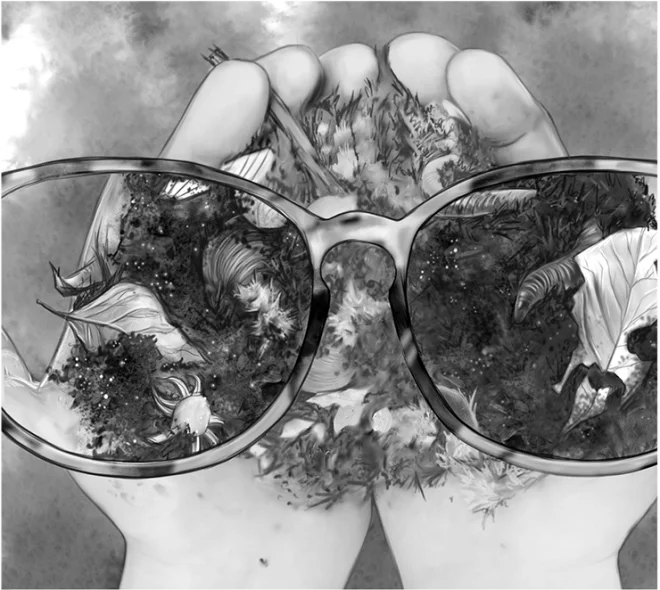I used to be very nearsighted, but I didn’t get my first glasses until I was seven. I didn’t mind. From an early age I loved to sit on the ground, in the grass, at the beach, or in the garden, and examine all of the interesting tiny things I saw. I discovered that the sand in our Midwestern sandbox was full of miniscule shells and shell fragments, fossils I now suppose, fascinating in their intricate shapes. I was a wizard at finding four-leaf clovers among the grass. I put them to dry between the pages of my favorite books.
Having traditional parents who used their four children as a (not very efficient) labor force, I often found myself pulling weeds in the summer garden. I’d pull some grass and chickweed, maybe dig out a few dandelions. But after a few minutes I’d find myself sitting between the rows and watching ants, unearthing roly-polies, and looking at the differently sized fragments of soil.
Dirt wasn’t the uniform brown matter it seemed to be from a distance. It was composed of so many different things. There were sparkly particles of sand, tiny crystals of quartz, mica, and other minerals, as well as larger pebbles, smoothed by geologic processes I could only imagine. There were fibers from decomposed vegetation, crumbly brown strands from stems and twigs, and flat fragments of well-rotted autumn leaves. I’d find worm castings, fragments of dead insects, bits of eggshell from the compost, and strands of mycelium from wild fungus. I could spend hours poking through soil.

Then I got glasses, grew (a little) taller, and became older—all of which took me away from examining the earth. Occasionally I’d push my glasses up and sit on the beach, leaning down to look at the sand, or in the lawn to watch the tiny wildlife, or in the garden as I planted or weeded. But I no longer got lost in the minute and detailed world of soil as I had in my early years.
I am no longer near-sighted. This year I had my cataracts, which had begun to make night-driving difficult, fixed with fancy implanted lenses. These allow me to see clearly—from computer distance to far away. It is miraculous, the technology that allows us older people not to become progressively blind as our own lenses become cloudy with age.
But there is a downside.
I had always been the person in the room who could best thread a needle. When small things were lost in the carpet, I could get down close and find them (though in recent years getting up again was becoming a challenge). And I am no longer easily able to see and examine the infinitesimal things in my world.
Because of my nearsightedness, I didn’t need the magnifying glasses and reading glasses my peers used in their forties and beyond. But now, for close work, I’d had to buy several pairs of readers—all with crazy and colorful frames. (Why not?)
This morning, as I dressed for the garden, on a whim I grabbed my bright blue half-glasses from the dining table next to a cookbook and stuck them on top of my head. I dug and raked for a while, but then sat down in the chilly path between my raised beds, pulled the glasses over my eyes, and picked up a handful of soil.
I live in North Carolina, near the border of the Coastal Plain. My soil is mostly sand, depleted by years of chemically heavy cotton and tobacco farming. I’ve amended my garden with lots of purchased and homemade compost, organic fertilizers, and animal bedding, so the soil there has come to resemble loam—dark and more adherent than the plain sand. But as I examine the particles, I see much less diversity than I remember from my mom’s garden. There’s more uniformity in size, texture, and color. There’re fewer worms and bugs moving through their subterranean world.
Now I understand more fully why it seems like such a struggle to get things to grow here. It’s not just the voracious insect pests or the baking heat or the dry summer weeks one after another. I need to work harder on restoring life and diversity to the actual soil of my garden. I think I’ll bring the bags of oak leaves my son has raked from his wooded yard and add them to my compost bin. The goat barn needs its bedding replaced—I’ll move that mix of straw and animal pellets to the garden. I need to get back to picking up bags of coffee grounds from the local Starbucks.
And I’ll keep putting on those magnifying readers and getting down close to the soil as I did when I was little. (Heck, I’m beginning to shrink from my towering five foot, three inches anyway.) Maybe I’m no longer nearsighted. So I’ll be closesighted, instead. My garden will be better for it. ❖


 Previous
Previous


God Bless You. Just To let you know started to wear glasses at the age of 5.I was only one who took off glasses to see up close. Could read books and letters without glasses. I got Drafted in 1968.Didn’t go to Vietnam because of my eyesight. If I lost my glasses couldn’t see anybody at a distance. Still to this day take off glasses when I am working up close.
Our Lord has given us much to inspire us! A very good read.